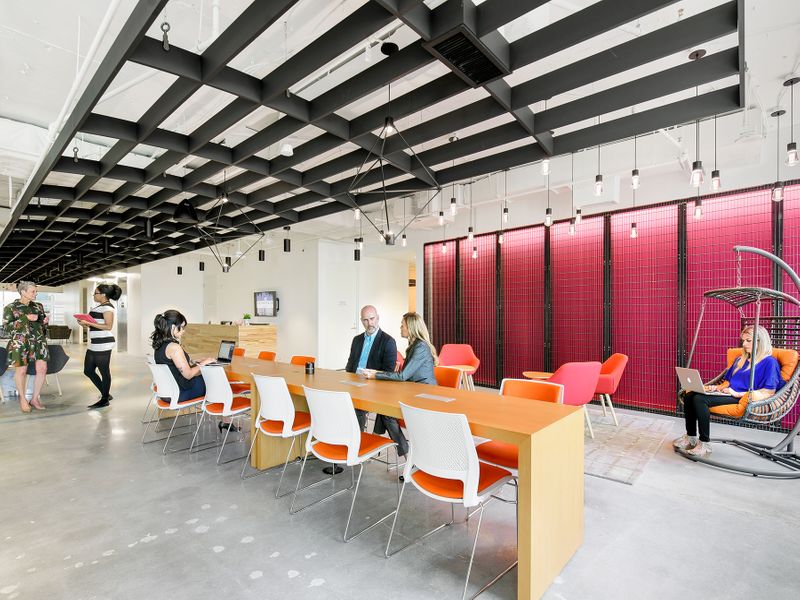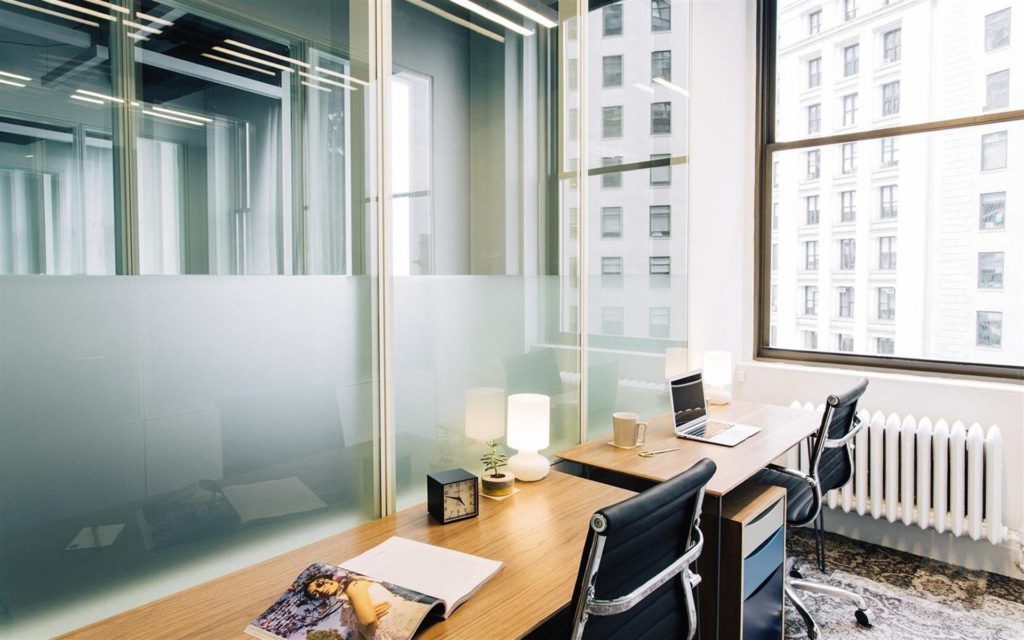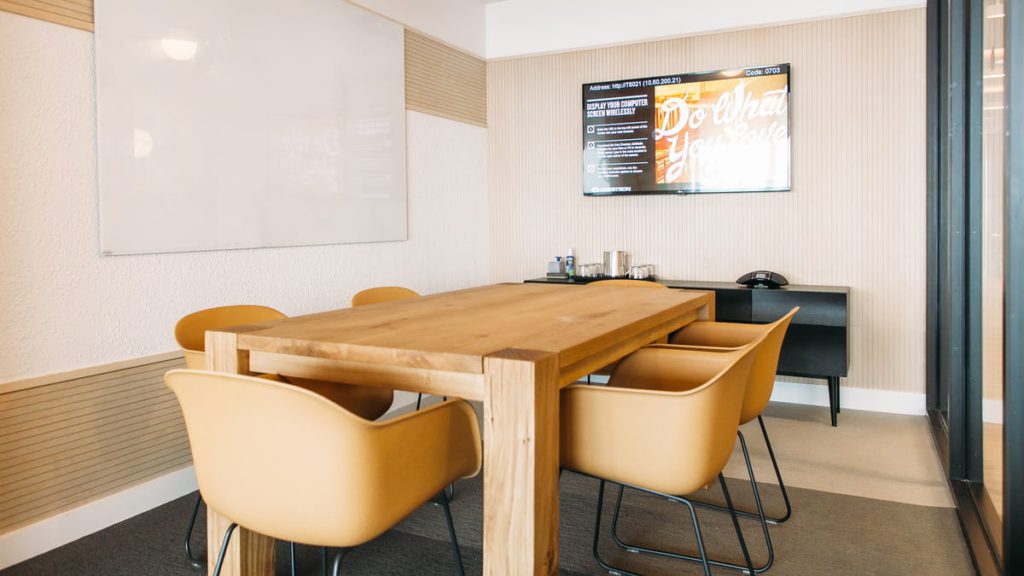
According to CNBC, coworking spaces were the fastest-growing office space solution in commercial real estate. Though they currently make up less than 5% of the market, experts expect them to make up 30% by 2030, with New York and London becoming the world’s leading cities in terms of new spaces opening up.
What is a coworking space and why is it trendy? Coworking, in general, is defined as when people gather in a neutral location to work on different projects alone or in groups on the same project. The people in a coworking environment aren’t from the same company, which makes it different from a traditional office setting.
Coworking spaces provide many of the same benefits as a regular workplace, and a lot more. Flexibility is a key benefit because tenants don’t have to sign a long-term lease in a coworking space. Coworking spaces often provide what the tenants need, such as WiFi, printers, and a conference room. Some will even provide tea, coffee, and snacks.
Coworking spaces come in a variety of sizes and shapes, but the most popular are open workspaces and private workspaces. Let’s find out the difference between these two types of coworking spaces and which one suits you best.
Open Workspaces vs Private Workspaces

Open workspaces are usually associated with the phrase “coworking,” as that is where the word originated. Members of different companies use shared areas in these types of workspaces, which have hot desks or dedicated desks.
Private workspaces, on the other hand, are the polar opposite of open workspaces. These private areas can be in the form of an office or even a suite designed specifically for large groups of people. Members of the same company either share a dedicated space or a combination of areas that the company has leased or rented.
These quiet, private, fully furnished offices combine the advantages of a coworking space with that of a private office.
When to Use a Private Office in a Coworking Space

If sharing your desk or working side-by-side with others does not meet your specific work needs, you should consider a private office in a coworking facility instead. The benefits of a dedicated workspace shouldn’t have to be sacrificed in exchange for a collaborative setting and modern workplace facilities.
Here are some scenarios when having a private office is more ideal than the traditional coworking setup:
1. When you need privacy for meetings
Traditionally, coworking spaces provide conference rooms for when you have a private meeting that needs a professional setting. These rooms, however, are generally offered on a first-come, first-served basis or must be arranged in advance.
If you want the freedom to schedule private meetings on a short notice or if you conduct a lot of business meetings, a private office may be the better option. A private office space gives you the freedom to host meetings or conferences whenever you want, without worrying about the venue.
(Related: Who are private office spaces for?)
2. When your team needs to work together
Coworking spaces are a cost-effective option for certain startups and larger firms opening satellite offices to enjoy a professional workspace.
When a group of people is working together, however, privacy and the capacity to speak freely at any moment are often required.
You may wish to hire a private office from your coworking space instead if you are concerned about disrupting others who are at work or disclosing sensitive corporate information during a team meeting.
These offices will be less expensive than renting private office space in a corporate building, but will provide your staff with the same benefits.
A private office in a coworking space can be a sensible choice for a small team, with the amenities and cost-effectiveness of a coworking space but the independence and privacy of a dedicated workspace.
3. When you need to handle sensitive information
You don’t need to have a meeting to need privacy while working. Many professions require the handling of sensitive data on a regular basis. If you often perform tasks involving sensitive, confidential, or private information, consider renting a private office within a coworking space.
4. When you cannot bring your work home with you
If you work in a coworking space, you’ll have to either pack up your stuff every night or leave them at your desk.
Many people are hesitant to leave their papers and electronic gadgets overnight if they don’t have a secure place to put them. Moving stuff back and forth every day, on the other hand, can be inconvenient.
You can solve this problem by getting a dedicated office at a coworking space. A locked office allows you to leave any of your personal or professional belongings overnight without fear of them being stolen.
This method also prevents any inadvertent loss or theft of information that could occur if you kept files at home or carried it to and from your workplace every day.
Just lock your door, go home, and return the next day, confident that everything will be in the same condition as when you left it.
5. When you need to focus
Interruptions are never pleasant, but if your work necessitates long periods of concentration, a private office at a coworking space may be beneficial.
Others making phone calls, speaking with each other, or attempting to communicate with you might cause distractions in a shared deskspace.
You have two options: use noise-canceling headphones and risk being disturbed, or go into a private office.
This private office setup allows you to work with fewer interruptions while also having the option of joining a creative group right outside the door. You can be most productive throughout the day while enjoying the best of both worlds.
What’s Next?

Coworking spaces are great for their ability to foster creativity and collaboration. But if you need to have privacy for your meetings, work with your team, handle sensitive information, or work without distractions, a traditional coworking space won’t cut it. Getting a private office in a coworking space lets you enjoy the benefits of a flexible working space while giving you the privacy and security of a traditional office.

Enterprise software development experience. More recently in positions including CTO, Lead Developer and Head of Product in Australia. Deep expertise in property and legal technology in Australia with a specialty in lead generation and tech scalability across Asia-Pacific.